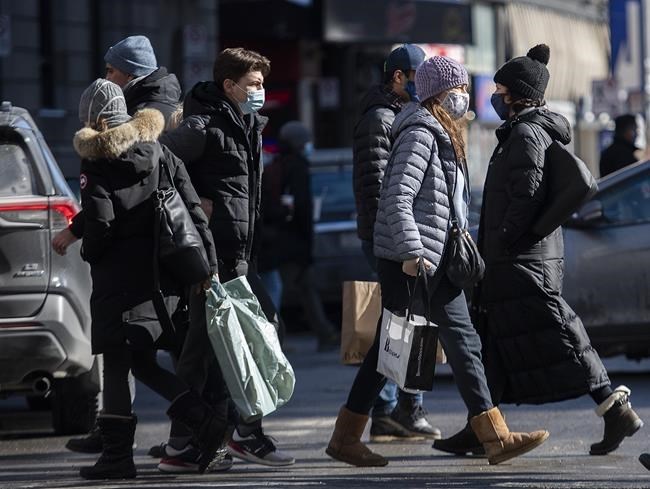Learning a new language as an adult isn't necessarily more difficult than picking it up as a child, some linguistics and phonetics experts say.
But it takes a bit more work, they add, and more desire and motivation to learn it.
The CEO of Air Canada caused a stir last week after delivering a mostly English speech to the Chamber of Commerce of Metropolitan Montreal, telling reporters afterwards he'd been able to live in Quebec without speaking French.
While Michael Rousseau apologized for the comment and told his employees in a letter — in French — that he had hired a private tutor, a linguistic expert said she was "disturbed" that Air Canada didn't ensure their CEO was bilingual in the first place.
"Strictly speaking, Air Canada is in the private sector but it's really a very symbolic company," said Monica Heller, a linguistic anthropologist with the University of Toronto. "It wouldn't take much (for Rousseau to learn French).
"It's not like he doesn't have access to corporate or private resources.... And people learn all kinds of things at all ages of their lives. It's never too late."
Canada's deputy prime minister Chrystia Freeland wrote to Air Canada's board of directors this week, urging Rousseau improve his French and that his knowledge of the language be included in his annual performance review.
Freeland also asked that French knowledge become an important criterion for securing promotions at the airline, which is subject to the Official Languages Act requiring services in French for routes that include airports in Ontario, Quebec and New Brunswick.
There is no specific rule that Air Canada's CEO be bilingual.
Rousseau replied to Freeland's remarks Tuesday, accepting the recommendations and agreeing to review French proficiency requirements for a broader swath of senior positions.
Sabreena Ghaffar-Siddiqui, a sociology professor at Sheridan College, said she was more disappointed with Freeland's comments than Rousseau's inability to speak French.
Ghaffar-Siddiqui said a CEO of a company should speak French if it is a job requirement, but the issue for her is the bilingual prerequisite for higher-ranking positions within the Canadian government or other sectors in the first place.
Ghaffar-Siddiqui, who specializes her research in social inequality and immigration, said bilingual job requirements rule out a number of Canadians who don't have access to learning fluent French.
"That's where I feel like Canada's commitment to bilingualism is exclusionary," she said. "The people who are being selected for higher-ranking jobs are from a tiny pool of people — mostly white, upper class, English-speaking families who have the opportunities to learn French as a second language."
Ghaffar-Siddiqui said Rousseau's financial and social position makes it easier for him to take French lessons, compared to a newcomer to Canada who doesn't have the same resources.
Rousseau told reporters last week he had been too busy to learn French and said he had no trouble living in Quebec as an English-speaker for 14 years.
Jeff Tennant, a French studies professor and phonetics and sociolinguistics expert with Western University, said that comment was probably Rousseau's biggest blunder.
"That's not what Quebecers want to hear," he said, adding that while Rousseau's job keeps him busy, his socioeconomic status also affords him opportunities to learn the language.
"Somebody in such position of economic power, they have financial support, they can hire a tutor, they can use vacation time to take intensive immersion courses," he said. "A newcomer might have ESL courses but there are challenges. The priority is sometimes just getting by.
"So (Rousseau's) busy-man argument is really, really hard to accept."
Tennant said Rousseau's residency in Montreal — where he can read French newspapers, listen to French radio stations, and practise conversation skills more widely — help keep him immersed in the language.
Heller said the notion that it's more difficult to learn a language as an adult is mostly a myth, though it's easier to pick up new accents — or let go of previous ones — when studying at a younger age.
Heller added the level of French knowledge expected of Rousseau would be different than a newcomer who needs to be more fluent to get by in everyday life.
"What is expected of him? Is it that he come across as though he's been speaking French all of his life? Or does he want to be judged as an anglophone who put in a pretty good effort, who can understand what he needs to understand, write what he needs to write, and say what he needs to say?" she said.
Heller said it's hard to put a timeline on how long it might take someone to become conversational in a new language, calling it an ongoing educational process.
She said people learning new languages have to be OK with making mistakes in grammar or vocabulary.
"There's some vulnerability, some humility, but that's actually how you learn," she said.
"If (Rousseau's) prepared to make mistakes and have someone say: 'No, that's the wrong verb,' or: 'No, that's not how you pronounce it,' learning by doing is going to get him farther faster."
This report by The Canadian Press was first published Nov. 10, 2021.
Melissa Couto Zuber, The Canadian Press




